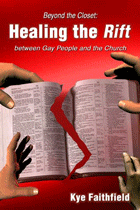
 The View at 60
The View at 60by Kye Faithfield
Kye Faithfield is the author of Beyond the Closet: Healing the Rift Between Gay People and the Church
Cosmetic surgery is one of the standards by which people are now judged. The vogue among trans people who can afford it, for example, is facial feminization surgery for males-to-females, and masculinizing implants and other enhancements for females-to-males. Your life depends on getting "the look" just right, and if you’re a person like me who can’t afford the tens of thousands of dollars such procedures cost, you’re toast. For others, cosmetic surgery is a status symbol. It establishes that you’ve made it because you can afford it—and, of course, if you start your procedures early enough (even teens are routinely having nose jobs and breast implants and tummy tucks), you’ll never have to look old, you’ll never have to feel ugly, and you’ll never have to be fat—the greatest scourge in a society whose ideals are anorexic models and unnaturally bulging muscles. There are many cases of things going terribly wrong under the knife—at the hands of unskilled surgeons; for some who had undiagnosed illnesses; or for those we all know about who simply carried their obsession with the body too far. But even such considerable risks can’t deter those who are determined to recreate themselves into their own images, for their own satisfaction.
I do not disavow the benefits of cosmetic surgery. If it weren’t so expensive, I might take advantage of it myself. But at 60 I‘m making peace with the temporal me with all my flaws and imperfections, knowing that one day I will discard this mortality for something infinitely better. Having climbed this mountain whose summit reveals the panorama of my life, the past is fading into the mist while a new path is dawning into the future. And I can see quite clearly now the thing we all must ultimately face, no matter how many surgeries we may have to forestall it, no matter how many pairs of rose-colored glasses we may hide behind in order not to deal with it. I am poised on the brink of eternity, preparing to take the final, inevitable plunge.
There are two responses most people have when forced to think about the end of life. The first is to fear Death, shrouded as he is in darkness and mystery and terror in fantasies like Charles Dickens’ A Christmas Carol. Some go to elaborate lengths to indefinitely postpone his arrival through radical medical procedures, extreme health regimens, and even cryogenics, which holds out the hope that a frozen corpse can be preserved for a future time when it will be revived, its cause of death successfully conquered. In the Bible, Paul says death is feared by those who don’t understand it, and thus are sorrowful because they have no hope (1 Thessalonians 4:13). Perhaps the fear of death is bound up in the fear of dying badly, as with a devastating terminal illness. Whatever the case, most of us don’t like to think, let alone talk about, dying. We often postpone until too late recording our wishes for our demise or near demise, as if not dealing with it will make it go away. But as the recent Terry Schaivo tragedy illustrated, not making a Will can have dire consequences for us and for those we leave behind.
The other response to death is resignation: it’s coming, nothing can be done about that, so we might as well "eat and drink, for tomorrow, we die" (Isaiah 22:13; 1 Corinthians 15:32; Ecclesiastes 8:15). For some, this resignation is tinged with hope: faithful Muslims look forward to Paradise; Hindu and Buddhist believers expect to return through the stages of reincarnation in an ever higher spiritual progress, continuing their journey until they reach nirvana, the state of perfect peace and freedom from desire. Catholics who seriously practice their religion look forward to eternal bliss, after first doing penance in a place called purgatory for the wrongs committed in life. And believing Protestants bypass purgatory, hell and reincarnation altogether, going directly into the presence of God at death. Atheists have no such outcomes to worry about; they simply die—and fade into the void of oblivion, which they believe is all there really is. Regardless of our beliefs, however, not many of us seem especially eager to embrace that inexorable end. "You only live once," we say; "better make the most of it."
People who contemplate death ask big questions: "Why was I born?" "Is there life after death?" "Where am I going when I die?" Though one of the great tasks of religion is to provide answers to the riddles of life and death, people are sometimes insecure about what their futures may hold and search for meaning beyond traditional dogma. Esoteric teachings like the kabala, and writings of prognosticators like Nostradamus (1503-1566), are increasingly being consulted. Many such predictions indicate extraordinary times ahead for Planet Earth, from monumental global changes to the coming of what the church calls "The Antichrist", in a period of "tribulation" so devastating that humanity will barely escape without being completely destroyed. These changes will arise, they say, because of the wickedness of humankind.
Yet apart from the issue of worship and the visions of seers is a powerful, life-changing principle for living often scorned by those who can offer nothing better. This ancient code of conduct provides real healing for the moral dilemmas of our time yet is relevant for all time—and transcends the boundaries of race, religion, sexual orientation, and gender. It connects every human being in a cooperative spirit of responsibility simply called The Golden Rule, "Do Unto Others As You Would Have Them Do Unto You" (Matthew 7:12), based on loving our neighbor as we love ourselves (Romans 13:9-10). As we respect and care for ourselves, so we should care for others and treat them with respect. In turn, we should expect to be treated in the same way. Our failure to live by these humane precepts is at least one major reason we are reaping the global consequences of man’s inhumanity to man.
Inhumanity starts as negative behavior early in life. Whether we see people as basically good or bad, we all know how cruel kids can be, and that hardly anyone completely escapes an encounter with a bully at some point in life. People too easily dismiss the harmfulness of bullying—until there is an event on the order of a Columbine massacre, where kids snap under the oppression of tormentors and wind up killing others and/or themselves.
Dr. Phil (http://www.drphil.com/show/show.jhtml?contentId=1107_bullies.xml) recently interviewed American Idol star Clay Aiken, who spoke of his own unhappy childhood experiences of bullying. Dr. Phil explained that the real face of bullying is cowardice. On a spiritual level, however, whether the bully is a kid in middle school, a parent, a boss, a national dictator, or a former marine who recently spat tobacco juice in Jane Fonda’s face because of something she did 40 years ago, the motivation behind such intimidation is a disrespect for the feelings of others, and a contempt for human life. Worse, bullies think their actions are justified; they don’t care about the consequences to their victims. As rape is a crime of violence, so bullies are filled with rage and take pleasure in inflicting pain as an outlet for that rage, whether through mental and emotional cruelty or through violence which can lead to tragedy. What might have happened to Jane Fonda had her assailant caught her alone on a street, rather than at a public book signing? Bullying in any form is tyranny. Parents who choose to look the other way when they glimpse their child threatening or attacking another, or who actively encourage such antisocial behavior because they don’t see it as bad, are creating monsters who could become tomorrow’s serial killers, Oklahoma City bombers, or gay-bashers. The Golden Rule, "Do Unto Others, As You Would Have Them Do Unto You," must be taught—and learned.
In my book, Beyond the Closet: Healing the Rift between Gay People and the Church, I wrote that Jesus predicted the very destructive attitudes and behaviors so much in evidence today. He taught that the ability of human beings to care for one another even in close personal relationships would diminish to a point where they would be unable to truly love others. He described this behavior as "psycho", the actual Greek word for a disorder where "...the love of many will grow cold" (Matthew 24:12). An inability to love reflects a sick mind and heart. As we witness the cruelty, hatred and murderous evil now so prevalent on a global scale, it is clear Jesus’ prophecy is being fulfilled. When terrorism threatens every segment of a society—including the relentless persecution of gay, lesbian and transgendered people by gay-bashers and religious zealots; the disdain toward those who are different from oneself; the hideous betrayal by the people we trusted most; the insensitivity of the power elite who make laws against the poor and disenfranchised; and the continuing race and class prejudice perpetuated by irrational hate mongers—then it is indeed experiencing psycho. The Golden Rule has not influenced us to do good—and that failure has cost us dearly.
Fortunately, we’re not too late. There are still people around like Matt Casias, who took a bullet point blank in the chest while trying to disarm a group of thugs attacking a woman he didn’t even know (http://www2.oprah.com/tows/slide/200504/20050421/slide_20050421_108.jhtml). I think of "fashionista" (his self-description) Steven Cojocaru of Entertainment Tonight red carpet fame, recently in the final stages of kidney failure, for whom his dear friend Abby Finer gladly donated her kidney to save his life. And I’m proud of those like Ron Donaghe, who care enough to befriend and advocate for authors and strugglers like me. Yes, there is indeed hope when people simply consider the feelings and the needs of others. Such changes don’t happen overnight; they must begin with "The Man In The Mirror"; they must begin with you and with me.
As I stand on my summit straining forward to catch a faithful glimpse of a shining Eternity that will be forever free of pain and adversity, I cannot help looking back into the mists at mistakes made in immature times when I was not always as considerate as I might have been. I’ve resolved to be more patient, more tolerant, more loving—and to remind people that to help ourselves and others, we could hardly do better than to live the Golden Rule. At sixty, I’m just old enough to dream of what our world could then become.
_______________________________________
Kye Faithfield is a former middle school music teacher, and proposal and grants writer for private foundations and government agencies. She published her first book, Beyond the Closet: Healing the Rift between Gay People and the Church (ISBN #1-4137-1730-6) in July, 2004, and has since completed a novel. A composer of classical music, she recently finished a group of five virtuoso piano pieces titled "Visions of God". Kye resides near Philadelphia, PA, and hosts a website at http://healingtherift.com.